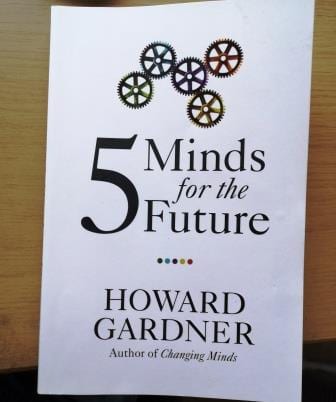Howard Gardner’s 5 Minds for the Future is an inspirational read and a timely reminder of the aptitudes that our fast-paced environment demands we master as we strive to excel. For leaders, I recommend it as a recruitment guide for identifying those key individuals who can both continue to learn and help preserve a zest for learning in your organisation.

The 5 minds are:
- The Disciplined mind developed through study and reflection (of sciences or the arts) provides a basis for thinking distinctively about the world. The hallmark of a disciplined mind is that it enables an individual to make steady and essentially unending progress in the mastery of a skill, craft or body of knowledge.
- The Synthesising mind is the ability to knit information from disparate sources into a coherent whole or narrative. The best evidence of an effective synthesising mind is the use of apt metaphors (a capability that Aristotle deemed a sign of genius).
- The Creating mind is at work when a project is recognised to have had a genuine and detectable influence on its domain. While the synthesising mind seeks order, equilibrium and closure, the creating mind is motivated by uncertainty, surprise, continued challenge and disequilibrium. Note: the value of the creating mind is unlikely to be recognised in an organisational culture where conventionality is rewarded and where deviants are marginalised.
- The Respectful mind seeks to work effectively with peers whatever their backgrounds and viewpoints. Gardner advises that it is difficult to maintain respect within an organisation when those outside the organisation are deemed enemies.
- The Ethical mind involves an additional step towards abstraction. Looking at things ethically is a way of transcending our inward looking concerns and identifying ourselves with the most objective point of view possible. For example, in an era of rampant climate change the requirement is to think like a planet.
Gardner also differentiates between Laser intelligence which probes deeply into a topic and Searchlight intelligence which may not probe as deeply but is always scanning the environment and may therefore more readily discern connections.
It is a provocative read that caused me to ponder the question of what happens if the Creating mind finds itself serving an organisation that embodies the orthodoxy? This can raise a tension between respect and ethics.
Taken together, the 5 minds are a thinking system that can unleash original ideas that serve at scale or what Gardner refers to as ‘good work’. Good work may begin in the mind of the individual, but ultimately it must extend to the workplace, the country and the global community.
Anyone who wants to cultivate these minds must have a concept of what it means to be successful and what it means to fail. It could provide a fascinating context for an executive coaching conversation.
Contact me to discuss further.
Read here about the disciplines required to build an enduring legacy..
Share this on...